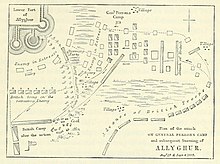| Siege of Aligarh | |||||||
|---|---|---|---|---|---|---|---|
| Part of the Second Anglo-Maratha War | |||||||
 Attack on Perron's camp and storming of Allyghur, Aug - Sep 1803 | |||||||
| |||||||
| Belligerents | |||||||
|
|
| ||||||
| Commanders and leaders | |||||||
|
| |||||||
| Casualties and losses | |||||||
| 900 | 300 | ||||||
The siege of Aligarh also known as the Battle of Aligarh was fought between the Maratha Confederacy and the British East India Company during the Second Anglo-Maratha War (1803–1805) at Aligarh, India. [2]
Aligarh Fort, one of the strongest forts in India, was fortified and commanded by a French mercenary officer Pierre Perron. It was laid under siege on 1 September 1803, by the British 76th Regiment, now known as the Yorkshire Regiment, under General Lord Gerard Lake. It was captured from the Marathas and French on 4 September 1803. [3] During the assault, fourteen ditches were lined with sword-blades and poisoned chevaux-de-frise around the fort by the French soldiers. The walls were reinforced with French artillery. Tigers and Lions of Scindia's menagerie were also used by the French. [3] During the battle, the British lost as many as 900 soldiers. [3] The then Duke of Wellington declared the capture as "One of the most extraordinary feats of the British conquest of Northern India". [4]
See also
References
- ^ Holman, Dennis (1961). Sikander Sahib; Life Of Colonel James Skinner 1778 - 1841. Heinemann. p. 80.
- ^ Naravane, M.S. (2014). Battles of the Honorourable East India Company. A.P.H. Publishing Corporation. p. 75. ISBN 9788131300343.
- ^
a
b
c Thackeray, William Makepeace (2013).
The Tremendous Adventures of Major Gahagan Chapter 2. CreateSpace.
ISBN
978-1490979120. Archived from the original on 23 June 2007.
{{ cite book}}: CS1 maint: bot: original URL status unknown ( link) - ^ Butalia, Ramesh C. (1998). The Evolution of the Artillery in India. Allied. p. 239. ISBN 9788170238720. Retrieved 10 October 2018.
External links
27°52′N 78°4′E / 27.867°N 78.067°E
| Siege of Aligarh | |||||||
|---|---|---|---|---|---|---|---|
| Part of the Second Anglo-Maratha War | |||||||
 Attack on Perron's camp and storming of Allyghur, Aug - Sep 1803 | |||||||
| |||||||
| Belligerents | |||||||
|
|
| ||||||
| Commanders and leaders | |||||||
|
| |||||||
| Casualties and losses | |||||||
| 900 | 300 | ||||||
The siege of Aligarh also known as the Battle of Aligarh was fought between the Maratha Confederacy and the British East India Company during the Second Anglo-Maratha War (1803–1805) at Aligarh, India. [2]
Aligarh Fort, one of the strongest forts in India, was fortified and commanded by a French mercenary officer Pierre Perron. It was laid under siege on 1 September 1803, by the British 76th Regiment, now known as the Yorkshire Regiment, under General Lord Gerard Lake. It was captured from the Marathas and French on 4 September 1803. [3] During the assault, fourteen ditches were lined with sword-blades and poisoned chevaux-de-frise around the fort by the French soldiers. The walls were reinforced with French artillery. Tigers and Lions of Scindia's menagerie were also used by the French. [3] During the battle, the British lost as many as 900 soldiers. [3] The then Duke of Wellington declared the capture as "One of the most extraordinary feats of the British conquest of Northern India". [4]
See also
References
- ^ Holman, Dennis (1961). Sikander Sahib; Life Of Colonel James Skinner 1778 - 1841. Heinemann. p. 80.
- ^ Naravane, M.S. (2014). Battles of the Honorourable East India Company. A.P.H. Publishing Corporation. p. 75. ISBN 9788131300343.
- ^
a
b
c Thackeray, William Makepeace (2013).
The Tremendous Adventures of Major Gahagan Chapter 2. CreateSpace.
ISBN
978-1490979120. Archived from the original on 23 June 2007.
{{ cite book}}: CS1 maint: bot: original URL status unknown ( link) - ^ Butalia, Ramesh C. (1998). The Evolution of the Artillery in India. Allied. p. 239. ISBN 9788170238720. Retrieved 10 October 2018.
External links
27°52′N 78°4′E / 27.867°N 78.067°E